Great Britain Rugby League Lions: Stories from behind the 2006 Tri-Nations tour
- Published
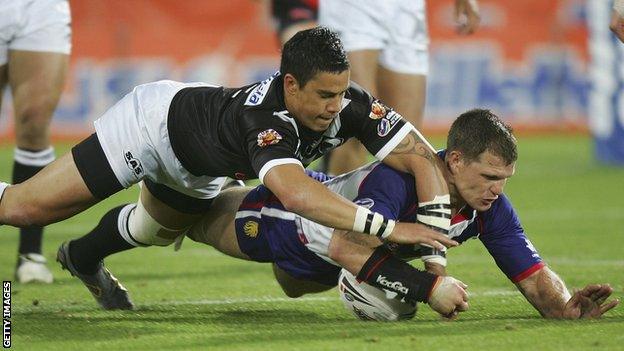
Great Britain's Stuart Fielden (right) started all four of Great Britain's Tests during the 2006 Tri-Nations series
Great Britain Rugby League Lions 2019 |
|---|
Date: 26 October to 16 November Matches: Tonga Invitational XIII (26 Oct), New Zealand (2 & 9 Nov) and Papua New Guinea (16 Nov) |
Coverage: All four games live on BBC Two, live text commentary on BBC Sport website, highlights on BBC One |
The Great Britain Rugby League Lions return to the international scene this weekend for the first time in 12 years.
Saturday's first meeting with Tonga will be followed by two matches against New Zealand and one against Papua New Guinea.
BBC Sport looks back on Great Britain's last tour, when they took on Australia and the Kiwis in the 2006 Tri-Nations.
The backdrop: Fielden's rise to the top
When Stuart Fielden strode over West Tigers' tryline and stopped for a moment to point at his team-mates before touching the ball down, you could be forgiven for thinking he was pointing at the world he had just conquered.
On 3 February 2006, Fielden cemented his status as the best forward on the planet as Bradford Bulls beat NRL champions West Tigers 30-10 to win the World Club Challenge.
That night capped the outrageous rise of Fielden, who didn't start playing rugby league until the age of 15, earning a trial at Bradford the following year.
A decade later, he was the reigning International Forward of the Year, had been named in the World XIII for four consecutive years and produced the complete prop forward's performance against the Tigers, playing 80 minutes, scoring two tries and winning the Man of the Match award.
The second of those tries saw Fielden take a short pass from Ian Henderson, hop through an attempted tackle and stand with the ball in hand while he pointed towards the hooker in acclaim.
The try had yet to be scored but, in an act of sheer bravado, Fielden was in no rush. The Tigers' players didn't attempt to stop him. They knew better than to try touching the untouchable.
"I wasn't there lighting my big Havana cigar saying, 'I'm so good'," he said. "I'd always focus more on the negative. I always thought I could play better. Looking back at the Wests game, you're not really going to play any better than that."
As an integral member of the Bradford side that dominated the game in the first half of the Super League era, Fielden was regularly linked with a move to the NRL to follow in Adrian Morley's footsteps as a British forward to shine in both hemispheres.
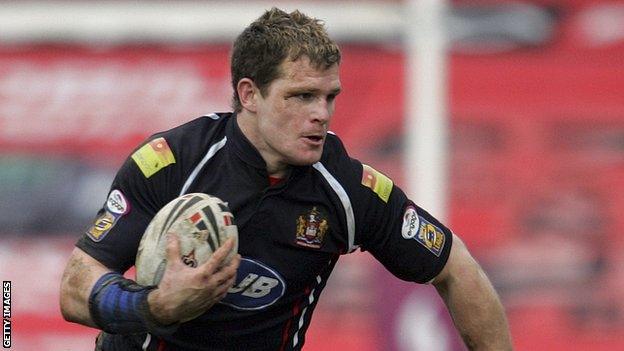
Stuart Fielden spent six years at Wigan, helping them to the 2010 Super League title
Instead, he remained in England, joining a Wigan side four points adrift at the bottom of Super League, and facing an unthinkable relegation, for a world record £450,000 transfer fee midway through 2006.
They had already raided Bradford for their coach, Brian Noble, and the arrival of the duo helped turn Wigan's fortunes around, winning nine of their final 11 games to beat the drop.
Noble was combining his role at the Warriors with the job as Great Britain head coach. With the 2006 Tri-Nations taking place in Australia at the end of the season, Noble spent every Wednesday afternoon preparing for Britain's first tour since 1999.
But there are things in life you cannot prepare for. Towards the end of the campaign, Fielden's mother, Marylyn, was diagnosed with liver cancer.
Fielden arranged for Marylyn and her friend to travel to Australia to attend Great Britain's fixtures - but on 24 September, just 35 days after she had found out about the illness and 10 days after Fielden turned 27, Marylyn died.
"I never really spoke to many people about it," said Fielden. "We had the funeral, but my mum's death hadn't really hit me at that time. I didn't feel it had anyway. It probably had."
The backdrop: Leeds woes 'a blessing' for Peacock
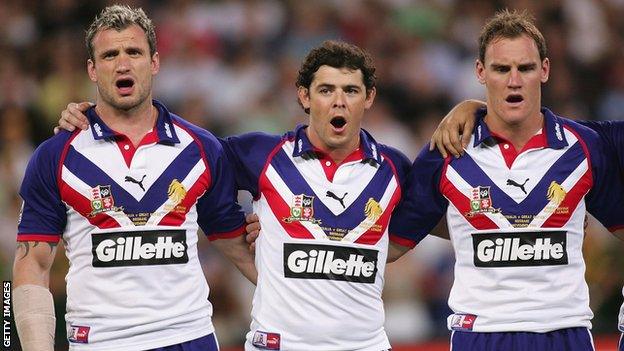
Jamie Peacock (left) was Great Britain captain for the 2006 Tri-Nations
At the end of the 2006 season, Jamie Peacock had a point to prove.
Another former Bradford stalwart who had won everything possible under Noble, Peacock captained Great Britain in the 2005 Tri-Nations before joining hometown club Leeds Rhinos.
The Rhinos finished as runners-up in every domestic competition in 2005, and Peacock's experience and track record of success was meant to help turn a talented group of players into serial winners.
Instead Leeds lost in the semi-finals of the Challenge Cup to underdogs Huddersfield before being knocked out of the play-offs by Warrington.
For the previous five campaigns, Peacock had gone into the post-season internationals straight off the back of the Grand Final. That defeat against the Wolves, he now admits, was "a blessing in disguise".
"I'd been thinking about the tour all year," he said. "I spent a bit of time each week mentally preparing myself to play well on that tour, knowing what kind of mindset I'd have to be in. The break gave me almost like a five-week pre-season."
Peacock makes a point
The tone had already been set for the tournament by the initial matches involving Australia and New Zealand, who played their opening two fixtures against one another while the Super League season concluded.
Australia won both, but the main talking point was the bad blood that emanated from the opening match.
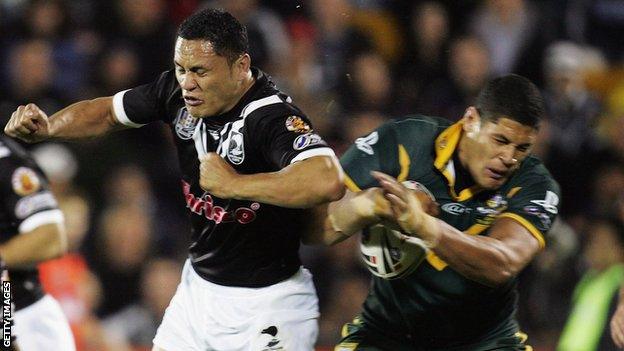
New Zealand's David Kidwell and Australia's Willie Mason were fierce combatants during the Tri-Nations
A brawl erupted between both sets of players and Australia's pantomime villain, forward Willie Mason, was left black-eyed and bloodied following a huge hit by Kiwi enforcer Dave Kidwell.
In their sole warm-up match, Great Britain were involved in an equally fiery 40-6 win against a Newcastle Select XIII.
Paul Wood and Peacock were both sent to the sin-bin for fighting with opposition players who were out to make a name for themselves.
"I made a decision knowing this was going to be a tour when it more than likely would spill over, and at any opportunity I'm going to be the first person there to protect my team-mates no matter what," said Peacock.
"I wanted to make a statement as a captain and as a side that we weren't going to be bullied."
Kiwis edge Great Britain in first Test
Noble had a selection dilemma ahead of the first Test against New Zealand about who to partner Sean Long in the halves.
St Helens had won the Treble - the League Leaders' Shield, Grand Final and Challenge Cup - in 2006 after Long had struck up a potent partnership with Leon Pryce, but Noble opted for Leeds' Danny McGuire at stand-off with Pryce deployed on left wing, albeit with the freedom to roam infield.
Despite playing some free-flowing rugby, Great Britain fell 18-2 behind before late tries from Paul Wellens and Gareth Ellis made the scoreline 18-14, leaving the Lions cursing an earlier decision from the video referee to rule out an effort from McGuire.
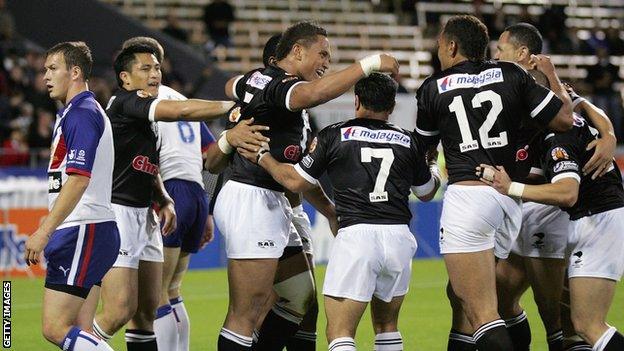
New Zealand bounced back from their one-off Test defeat by Great Britain at St Helens in June 2006 to win their first meeting during the Tri-Nations
If luck conspired against Great Britain in Christchurch, they were at least given a lifeline when New Zealand were stripped of their two points from the victory after Australian-born hooker Nathan Fien was found ineligible to represent the Kiwis in an episode dubbed 'Grannygate'.
Fien claimed his grandmother was born in New Zealand, but it was actually his great-grandmother.
'I'd rather be in Blackpool than Bondi'
The British players were given little time to dwell on the decision.
Few could have predicted the reaction when, in the build-up to the first game between Australia and Great Britain, Pryce half-jokingly told the BBC: "All the Aussies come over and say how good it is, but I'd much rather be back in Bradford. I'd rather be on Blackpool beach than Bondi beach. They can keep the country to themselves."
That comment made Pryce a public enemy in the eyes of the Australian press. Former Kangaroos centre Terry Hill wrote for Sydney's Daily Telegraph: "If Leon doesn't like it here, I'll fly him back to England myself. It would be economy class, though. I'm not sure Leon would know much about first class. In Bradford during the '94 [Kangaroos] tour, they told us not to walk home without a gun."
Pryce knew nothing until he received a phone call at 5am the following morning from Channel Nine news asking to explain his comments.
"I was like, 'You what? Shut up,' and put the phone down," he laughs. "Then I come downstairs and Terry Newton went, 'Have you seen the paper, Leon?' I could see some of the lads laughing so I looked at the paper and went 'What have I done? You idiot, Leon'."
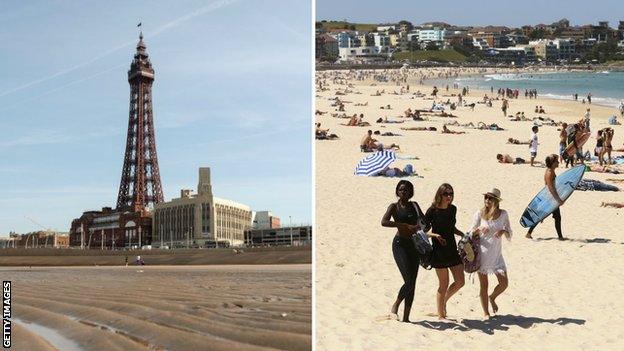
Leon Pryce caused a storm by saying he would rather be on Blackpool beach (left) than Bondi
Peacock added: "I could have understood it if he said 'Australians are rubbish at comedy and music' because that's part of their people and culture and what they're about.
"A beach is a natural object. I found it hilarious they got so upset about someone saying something about a natural object that's always been there."
Noble responded by naming Pryce in his preferred half-back position next to Long, telling the Australian media: "Leon Pryce will start at five-eighth as you call it over here, stand-off in Blackpool."
The incident only helped create a siege mentality. When the players travelled to the Sydney Football Stadium for a final captain's run the day before the game, Peacock could sense a big performance was on the horizon.
"It rained heavily all the way through, but we didn't drop one ball. It was the most ruthless, intense training session I've been involved in.
"When you all get together at the end you normally have a recap. 'What are we doing? How are we going to play tomorrow? Is everyone ready?' I looked around the group that day and did not have to say a word. It was just looks. Everybody was going to be on."
What followed has gone down in British rugby league folklore.
Great Britain rise to Kangaroos challenge
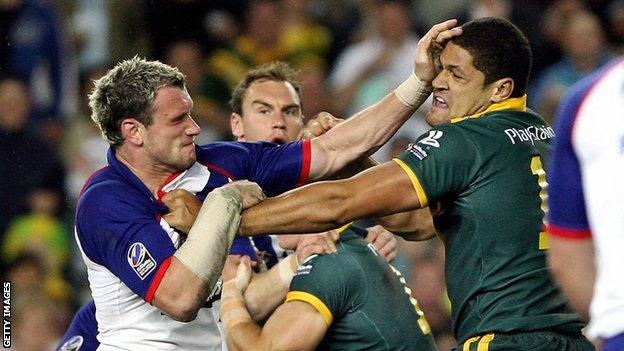
Jamie Peacock (left) clashed with Willie Mason after the Australian punched Stuart Fielden
It took just three minutes for the first flashpoint, when Fielden was knocked out by a clean punch to the jaw from Mason. Peacock lived up to his vow and steamed in, flattening Mason with a punch of his own.
Remarkably, bar a six-minute breather, Fielden played on until half-time. Mason went unpunished, even after a late elbow split Long's eyebrow shortly afterwards.
Amid the tension, Great Britain rose to the challenge despite falling behind when Ben Hornby intercepted Long's pass and fed Greg Inglis to run the length of the field.
But that error proved the catalyst for Long, one of the most enigmatic characters the British game has ever produced, to turn in a masterclass in one of the defining performances of his career.
The scrum-half toyed with the Kangaroos' defence to create the equalising score for Wellens. Shortly after half-time, Peacock powered over to give Great Britain the lead, only for Australia to hit back through another long-range try, with Inglis turning provider for Darren Lockyer.
But the tourists held their nerve and Lee Gilmour, on as a makeshift winger for the injured Brian Carney, scored under the posts.
It was then backs to the wall until the 75th minute when Great Britain broke away and slick handling allowed Gareth Raynor to cross in the corner to seal a famous win.
"I was still stood 60-80 metres back because it had all happened so quick," said Peacock. "As I saw him dive in the corner all the Aussies slumped down, knowing we're going to beat them in their own backyard, while all our boys jumped up in the air. That's stuck with me forever, it's my favourite moment of my career.
"Off the back of that we got down there again and Longy said 'Right, we'll put a drop-goal over. They'd do the same to us'."
Full-time: Australia 12-23 Great Britain. It was Britain's first win in Sydney since 1988 and remains the last victory over Australia by any team from these shores.
Tour unravels after Kiwis defeat
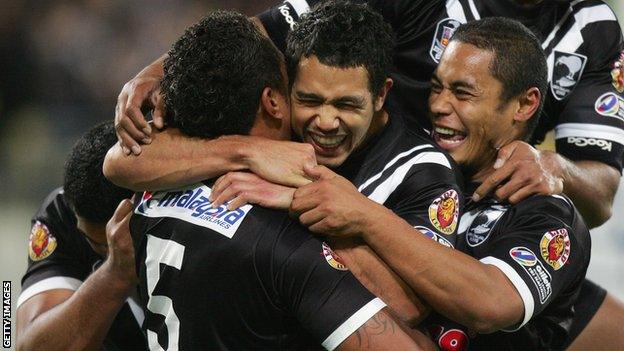
New Zealand scored six tries in their 34-4 victory over Great Britain when the side met for the second time during the 2006 Tri-Nations
The morning after, the squad, many of whom were still half-cut from the celebrations, entertained themselves during a rehab session in the hotel swimming pool by singing 'I'd rather be in Blackpool than Bondi'. Gareth Hock, meanwhile, had to be coaxed from his room, where he had just ordered a bottle of champagne.
The challenge now for Great Britain was to recover from the emotional high and subsequent comedown in time to face New Zealand in Wellington the following week. While the Lions battled with Australia, the Kiwis had a week off to prepare for what was a must-win game for them off the back of 'Grannygate'.
Carney's injury meant Noble had to re-shuffle his team as Pryce reverted to the wing and McGuire was reinstated at stand-off.
But New Zealand's Stacey Jones dominated Long and McGuire in the halves as the Kiwis ran out 34-4 winners.
Great Britain needed to beat Australia in Brisbane to guarantee a place in the final, but the aftermath of the defeat effectively ended their chances.
The following day, the squad flew back to Australia, but not before Long, Pryce and Martin Gleeson saw off a couple of bottles of wine before mixing their protein shakes with Baileys so they could continue drinking on the plane.
Their rowdy behaviour on the flight, external led to Noble having words with Long, and the scrum-half responded by packing his bags and returning home early, just a week after he had put Australia to the sword.
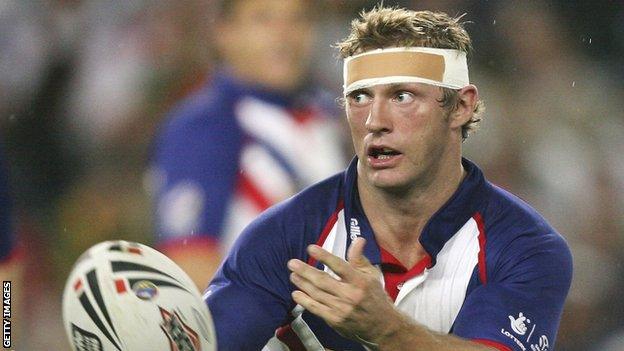
Sean Long headed home from the tour before the final game against Australia
Long has always maintained he was simply homesick, and his wife was pregnant at the time back in England. There is a scepticism among other members of the squad, however, amid suggestions he didn't see eye-to-eye with Noble and was particularly unhappy with the decision to move Pryce back to the wing.
"He'd run out of puff basically and needed to go home," Noble now says. "Did I try and persuade Sean Long to stay? Of course I did. But clearly it wasn't going to happen, so he went.
"Did it become a distraction [the disruption to the half-back pairing]? It might have been the issue of the trip if the truth be known.
"We've subsequently talked about it, me and Longy, we get on famously well now. I just thought everybody was in the same mindset as I was, 'We need to get over the line here and everybody will make the same kind of sacrifices'. I didn't realise we were struggling."
With Long back in England, Great Britain were beaten 33-10 as Australia scored two tries in the final five minutes.
Peacock was Great Britain's standout performer throughout all four games and was named International Forward of the Year. He remained in Australia on holiday after his side was knocked out of the tournament - which the Kangaroos won by beating New Zealand in golden point extra-time - and received an approach from Penrith Panthers to move to the NRL.
"I just said 'Look, it's a great offer but I've had a rubbish year at Leeds and I can't walk out on them'," he said. "I needed to go back and play well there."
The aftermath: Fielden's battle with depression
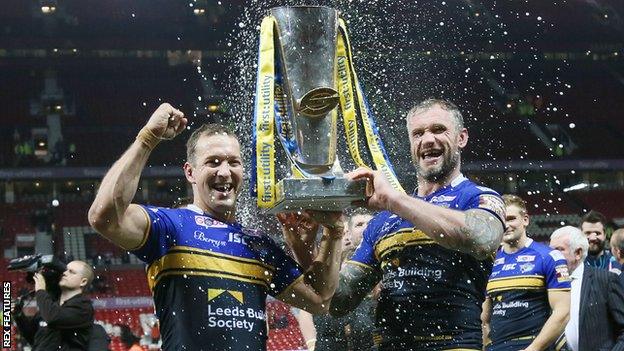
Jamie Peacock (right) won his ninth Grand Final, and sixth with Leeds, when the Rhinos beat Wigan at Old Trafford in 2015
Peacock and Fielden's careers can be viewed through a prism of before and after the 2006 tour.
While Peacock bounced back from a disappointing first year at Leeds to win six more Grand Finals, becoming the most decorated player in Super League history, Fielden struggled to regain his form as Wigan underwhelmed.
Reflecting on the plaudits that came his way after his display for Bradford against West Tigers, Fielden said: "The years that followed with depression and playing at Wigan, when I was playing badly, you look back on those games thinking 'How did I ever not think I was awesome there?'"
Fielden mentions depression so candidly it's difficult not to be taken by surprise. It's only now that the extent of the torment he had to deal with on that tour becomes clear.
Still coming to terms with his mum's death, he found himself crying in the toilets prior to Great Britain's warm-up game with the Newcastle Select XIII, a match in which he also picked up a knee injury that affected his performances throughout the tour.
During a training session on 17 October, Marylyn's birthday, he remembers running around the field "crying to myself", and he now admits: "I shouldn't have gone out, but me being me, I would never have not gone out."
The incident with Mason only exacerbated matters. Fielden was so concussed from the punch that he couldn't remember which team Great Britain were playing and even had to be told again that his mother had passed away. There were discussions about him returning home, only for it to be decided best for all concerned that he stayed down under.
"As an alpha male raised in the 1980s with the whole 'Don't talk about your feelings, men are tough', getting knocked out in that manner was severely harmful to me mentally," he said. "I struggled with it. At the same time I had a drop in form because I believed I was untouchable when I went on tour."
Fielden also points a finger towards the dangers of the game itself to explain why he suffered so badly afterwards. As a prop playing 80 minutes per match, Fielden was exposed to more than 60 collisions a game that have the equivalent force of a car crash, rattling the brain.
"It's almost proven now there's a link between your brain chemistry and depression and trauma," he says. "I think it's one of those things people are trying to brush under the carpet because they're scared. The RFL are doing a great job with it, but how much can you do to stop the negative impacts of rugby league? You can't. The simple dynamics of it are you've got grown men sprinting into each other."
The aftermath: Coping after full-time rugby
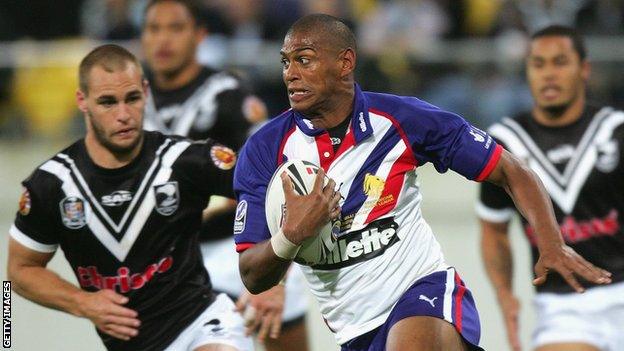
Leon Pryce won 17 Great Britain caps and had spells as a player with Bradford, St Helens, Catalans Dragons and Hull FC
Fielden's battle with depression is indicative of a wider trend of tragedy among the rest of that squad.
Newton took his own life at the age of 31 in September 2010, less than 12 months after being banned for two years for testing positive for a human growth hormone. In separate interviews, both Long, external and Pryce, external admitted they were close to the same fate.
Pryce suggests why this might be the case. As the first generation of professional, full-time rugby league players, that 2006 squad had committed their lives to playing a sport that leaves them physically and mentally scarred, but did not allow them the earning potential for a lifetime of financial security upon retirement.
"Pre-1996, all the players basically had a trade," said Pryce. "We were the first group of players that rugby league was our full-time jobs. You go straight from school with no trade into rugby.
"Ninety percent of the players come from working-class backgrounds; council estates, tough places. Rugby league is our way out. When you take that away from them it can be difficult to find your way in life.
"You've got to find yourself again somehow. Finding yourself is not easy, is it? You've maybe got to go through some rubbish, ride it out, then find yourself again."
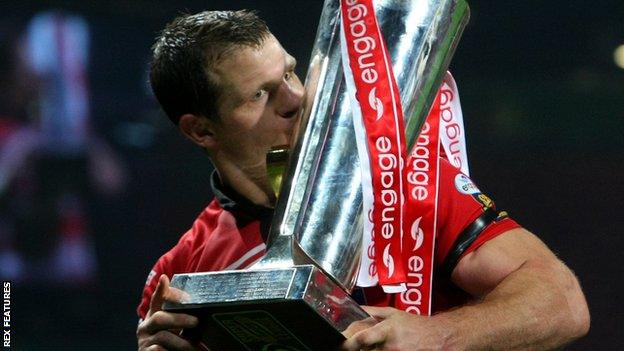
Stuart Fielden won the fourth Super League title of his career when Wigan beat St Helens in the 2010 Grand Final
For Fielden, that period of reflection came in 2010 when Wigan appointed Australian coach Michael Maguire, who placed an emphasis on improving his players' emotional intelligence.
Each player wrote anonymous reports on every other member of the squad, which were then given to the respective player to read. When Fielden received his, he had been described as selfish and difficult to be around by his team-mates.
"I just thought if I took myself away, sit in the corner, read my book, I can wallow in my own grief or self-pity and it doesn't matter," he adds.
"The awareness is, 'Actually it does matter. I'm one of the most experienced players and coming in moody or not moody matters massively'. At the time, for many years, I didn't think it did. I just assumed it was alright - it wasn't."
Fielden ended the 2010 season with his personal life in a much healthier state and his fourth Grand Final winners' ring. It's easy to think about how different his life may have been had he not gone on tour and instead given himself the time and space to grieve for the loss of his mum Marylyn. But Fielden feels nothing but pride at what he achieved.
"Being involved in that game was a massive thing," he says. "For me, personally, it was massively detrimental, but the actual game was probably one of my best wins ever. You've beaten Australia in Australia.
"People try to use it as a negative, 'Oh you got knocked out'. Well, yes, but you also got knocked out from a bit of a cheap hit, got up and played 40 minutes of a Test match.
"If you said to me, 'You're going to play in a Test. You're going to get knocked out, but you're going to play 40 minutes and you're going to win,' I'd go 'Can I order four of them?' In fact, can I order five?'"